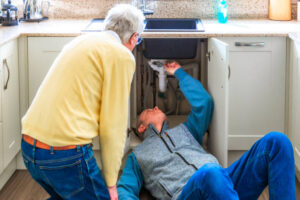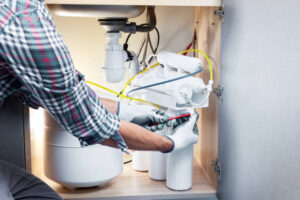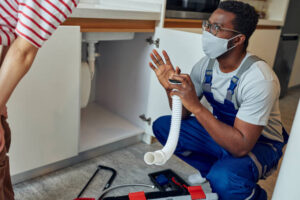Starting the shower and hoping for warmth only to be met with ice-cold water ruins a great morning. You then actually do need a water heater plumber. But could you not change it yourself; do you really need a specialist? Let’s break it down as, while some problems are simple solutions for a do-it-yourselfer, others, if mishandled, can turn into a costly mess.

When Your Water heater treats you with cold shoulder
Turning on the tap does not heat the water. First feeling? Examine the power source. If your gas heater runs a pilot light, is it on? If it is electric, did the breaker trip? These are immediate solutions. You have a more serious problem if everything seems well and you continue on spontaneous freezing plunges.
The offenders might be a faulty heating element, a broken thermostat, or tank sediment buildup. While some homeowners might be adventurous enough to investigate, reality is one error could cause a flooded basement or a major safety concern. Right now, a pro is your friend.
Water Like: It came from an old pipe.
If your water tastes weak tea, your heater may be corrobing from the inside. Not just unpleasant, this is a ticking time bomb. Designed to inhibit rust, the anode rod may have worn out. Ignored, the tank can develop leaks or totally break down.
Some folks think flushing the tank is enough, however once rust sets in none of the emptying will help. This is the moment to determine whether a basic part replacement will be sufficient or whether it is time to say goodbye to your old heater. You have to call a specialist.
The Neglected Puddle Under Your Water Heater
A little condensation? Not much. a newly forming puddle? That cries out a warning bell. Water collecting under your heater could point to a faulty connection, a leaky valve, or worst-case scenario a cracked tank.
A leak may start small, but water finds a way into areas it shouldn’t be in, resulting in structural damage, mold, and greatly higher repair costs. See wetness around your heater and know it is not just regular condensation; grab your phone and call a specialist before a serious disaster strikes.
One should watch water heaters rather than hear the Orchestra of “Binging, Popping, and Screeching”. If yours sounds like an antique steam engine or a popcorn maker, you most definitely have sediment buildup. Over time, minerals settle toward the bottom of the tank and form into a thick covering. This drives your heater to run more aggressively, overheating and generating all those terrible noises.
Early discovery would allow draining the tank to help. Still, if the accumulation is fairly significant, damage could already have been done. Ignoring it could lead to either tank breaking or overheating and inefficiencies. See an expert before your heater runs totally breaks down if you are hearing these sounds.

The Pilot Light That Will Not Remain Lit
If the pilot light of your gas water heater repeatedly burning out, it goes beyond just inconvenience. One can evaluate a blocked burner, a faulty thermocouple, or maybe a gas line issue.
Relighting the pilot is simple; yet, continuous problems indicate to a more serious one. And messing about gas pipes without sufficient knowledge? That is playing with fire exactly. A qualified plumber will safely find the problem, therefore preventing dangerous carbon monoxide hazards or gas leaks.
Younger than your water heater, is your first smartphone.
If your heater is running past the ten-year mark, it is using borrowed time. Older buildings not only suffer with efficiency but also become more vulnerable to leaks, rust, and full system breakdown.
Although regular maintenance increases the lifetime, finally replacement is the more sensible decision. An professional can help you assess the benefits and drawbacks of repair against replacement so you might optimize value for your money.
The Unpaid Costs of Ignoring Water Heater Problems
Ignoring a small issue is easy; expect it will resolve itself. The minor leak now could point to a flooded house tomorrow. An ineffective heater could be subtly raising your energy expenditures.
More importantly, certain problems can be quite physically dangerous. Your water heater could turn into an accidental pressure bomb from a damaged relief valve. Not exactly the type of house remodeling you are looking for.
See Professionals or Do It Yourself
Turning a fragile valve or changing a breaker? Now go forward. But above and beyond the fundamentals? Experience, tools, and knowledge help a qualified plumber to do a task accurately the first time.
Imagine yourself trying, without direction, to fix the engine of your car. Maybe if you like Russian roulette with repair costs. Water heaters have several possible issues even if they look simple.
Choosing the Right Water Heater Plumber
None of plumbers are created equally. Look for a professional you pay for experience especially related to water heaters. Learn about licensing, warranties, and whether they are aware of your particular equipment.
Check reviews, acquire referrals, and steer clear of selecting the least priced solution since over time a poor repair job could cost you much more.

Preventive Maintenance: The secret to a lifetime water heater
Calling a professional after your water heater breaks is like waiting until the engine dies of your car before getting an oil change. Regular maintenance will enable your gadget to last and prevent costly repairs.
Once a year flushing the tank helps remove trash from the tank, therefore preserving the effective running of your heater. Anode rod inspections stop interior rusting every several years. Inspection of pressure relief valves insures their correct operation, therefore preventing dangerous pressure build-up.
Professional plumbers handle these tasks quickly to ensure ongoing top functioning of your heater. Regular maintenance expenditures are significantly cheaper than those of an emergency replacement or water damage restoration.
Unseen dangers of a neglected water heater
Apart from frustration, a damaged heater can be fairly dangerous. A broken relief valve can produce too much pressure, so your water heater turns into an explosive hazard. Gas leaks in a poorly maintained unit can pose a carbon monoxide risk, odorless and deadly.


